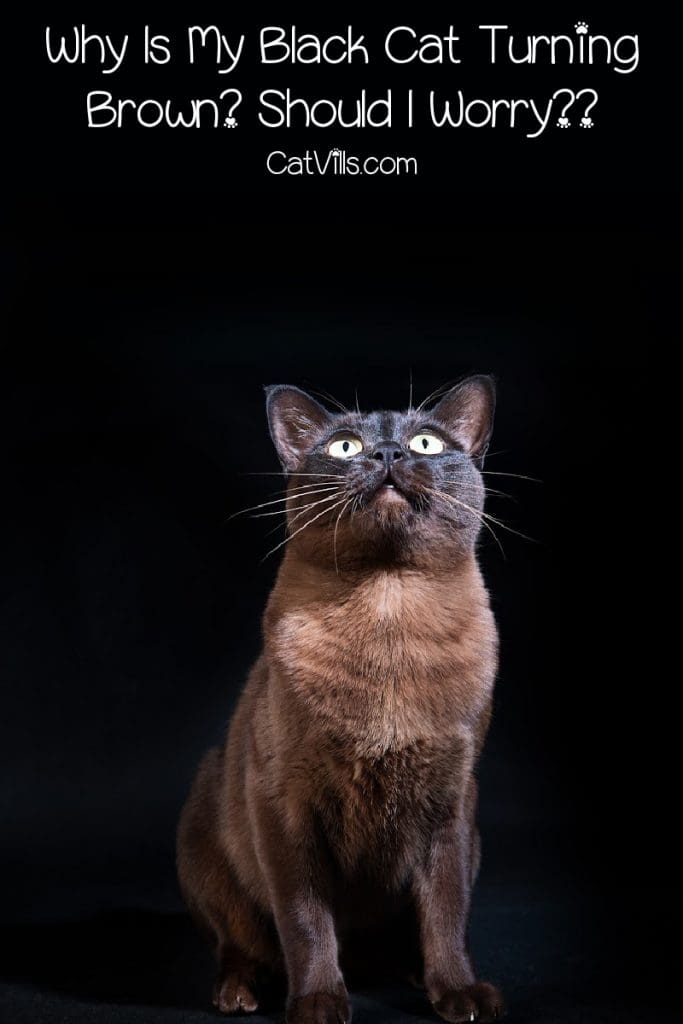Last Updated: 9 months ago
Why is my black cat’s coat turning brown?
If you’ve noticed a sudden change in your cat’s coat from black to brown or reddish-brown, many reasons could be causing it.
Fortunately, most of these issues are not causes for concern and can be easily resolved—except for one.
Keep reading to learn what it is, along with other less-concerning reasons.
Black Cat Turning Brown Reasons
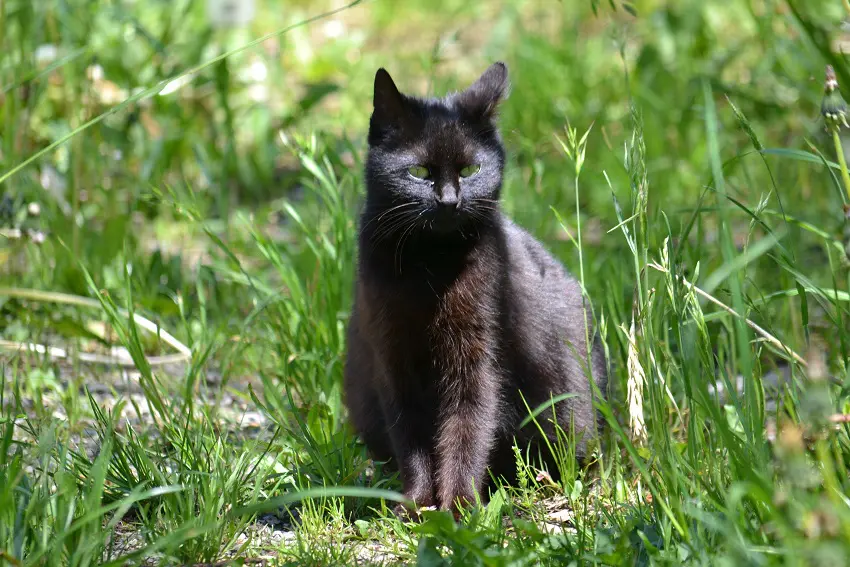
As mentioned above, the vast majority of the reasons are totally innocent and nothing to worry about.
However, in rare cases, the cause is far more concerning.
The sudden discoloration could result from a tyrosine deficiency, a copper deficiency, age, or too much exposure to the sun. In the worst-case scenario, it can result from renal failure.
Now, let’s discuss each of the things that could make your black cat turn brown in more detail.
1. Deficiency in Tyrosine
A black cat’s coat’s color results from a genetic makeup that leads to the production of more melanin.
Besides keeping the coats black, melanin also protects the cat’s skin from damage from UV rays.
And for their coats to stay silky and black, they continuously need the amino acid tyrosine to facilitate eumelanin production.
When there isn’t enough tyrosine in the cat’s body, the coat starts turning brown. Amino acids undergo translation to form proteins.
Cats need 22 amino acids, and 11 of these are considered essential. Being essential means that they can’t produce them in their bodies, and they have to get them from their diet.
Cats need tyrosine and phenylalanine for pigmentation. Phenylalanine is an essential amino acid that leads to the production of tyrosine, a non-essential amino acid.
Besides helping in the production of melanin, tyrosine is a vital component in thyroid hormones and neurotransmitters.
While your cat can effectively produce tyrosine from phenylalanine, it’s essential to feed them from various sources. Some of the sources of tyrosine for cats include meat, fish, and other animal products.
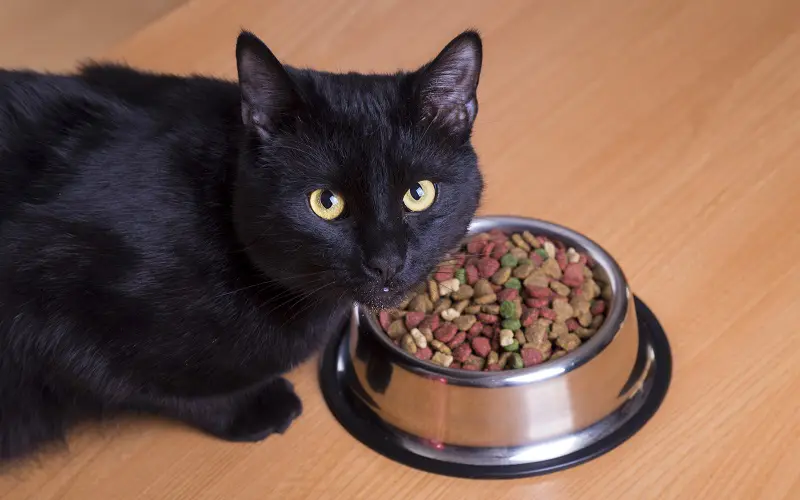
Rice may also contain tyrosine, but cats are carnivores, and rice is not an option. You can also add tyrosine supplements to their diets.
Can tyrosine supplements help?
You could include tyrosine supplements in your cat’s food. However, supplements may not be the best if your cat has another underlying condition.
Consult your vet first to make sure it’s appropriate, especially if they’re suffering from any of the medical conditions we mentioned or they’re pregnant.
What you can do is include lots of meat or proteins in a cat’s diet. Check the ingredients on the packages to see if they have a higher meat content.
Besides tyrosine, meat also provides cysteine, taurine, arginine, and other essential amino acids.
2. Copper Deficiency
This deficiency doesn’t often occur in cats, but it’s worth considering if your cat’s coat color starts changing.
Copper facilitates the production of the pigment melanin from Tyrosine. This explains why its deficiency may cause discoloration.
Copper also helps in the intake and transport of iron through the cat’s system. And it plays an essential role in various enzymes.
Other signs of copper deficiency include a change in the fur’s texture, ataxia, and anemia.
Include liver, grains, or supplements in the diet to ensure an adequate supply of copper.
3. Zinc Toxicity
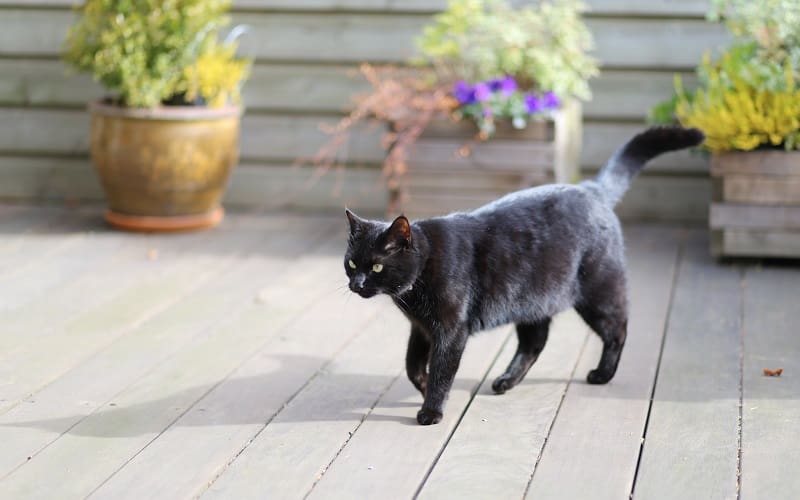
Zinc is vital for a cat’s skin and hair health. It’s also crucial for reproductive function and other body functions.
But when a cat consumes too much zinc, it may lead to a copper deficiency, causing discoloration, including making a black cat turn brown.
Additionally, diarrhea, vomiting, lethargy, and a lack of appetite may accompany this discoloration.
When you notice any of these symptoms, rush your cat to the vet as soon as possible.
4. Other Health Conditions
Health issues like liver disease, kidney problems, and thyroid problems can cause the coat’s color to change to brown.
For instance, the conversion of phenylalanine to tyrosine takes place in the liver.
So if it’s not functioning, there may be a deficiency in tyrosine.
Organ failures are fatal health conditions that require immediate treatment, unlike mineral deficiencies.
5. Age
Like in humans, a black cat’s coat turns gray with time due to aging.
But instead of going directly from black to gray hair, it starts by fading to a brownish color.
But if they’re too young to be turning gray, consider the other reasons I’ve discussed above.
6. Exposure to Sun
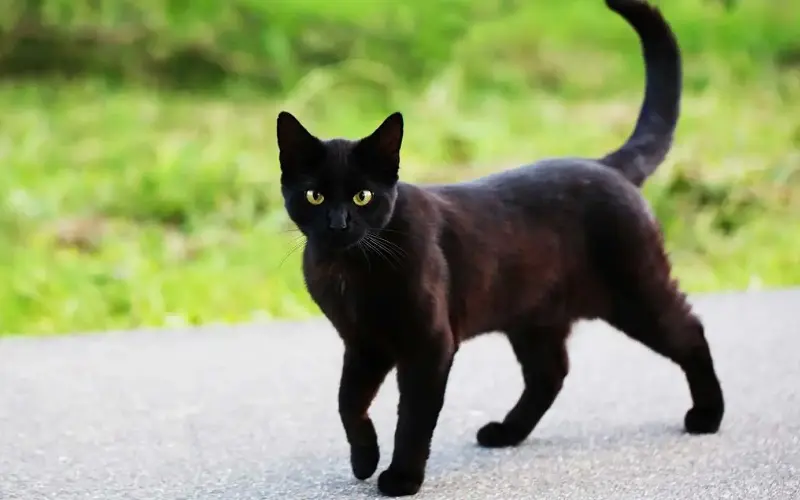
When your black cat spends too much time in direct sunlight, its fur may start turning brown.
If you’re not sure if it’s the reason, try taking your cat indoors for some time.
If the coat changes to black, then sun rays are the issue, and it’s nothing to worry about.
Some people also experience a lightening of their hair color when exposed to sun rays for an extended period of time.
The sun’s UV rays destroy the melanin, causing the black color to fade. But cats are always producing more melanin.
When indoors, the black color is restored. What you should do is monitor how much time they spend basking and bring them indoors occasionally.
7. Shedding
Black cats aren’t a breed. There are actually 22 black cat breeds, and some of them may shed their fur and some may not.
When they’re about to shed, they may develop a slightly different coat color than the one they usually have.
But after the shedding process, the new coat will always regain the usual black color.
Some of the black cat breeds that shed their fur occasionally include:
- Siberian
- Selkirk Rex
- Ragamuffin
- Scottish Fold
- Persian
- Maine Coon
- Manx
FAQs
Can a Cat’s Fur Pattern Change?
Solid-colored cats coats will remain solid. If they have a tabby or any other pattern, that won’t change either; only the coat color changes due to exposure to UV rays, aging, mineral deficiencies, or organ failure.
Do cats change color as they get older?
Yes, like humans, cats can change color as they get older. Not all do, but darker colored cats can definitely “go gray” with age. Lighter colored cats also develop gray hair, but it’s not as obvious.
Are all black cats brown in the sun?
Well, no, not necessarily. Some black cats do look more brownish in the sun because their underlying tabby pattern “shines” through.
Can a Brown Cat Turn Black?
Brown cats may turn black due to an excess of proteins or amino acids in their diet. This eventually leads to excess Tyrosine. If you notice this change, try to balance the mineral and vitamin amounts.
Final Word
Long story short, there are many reasons for black cats turning brown, why they look different in the sun, and so on.
Nine times out of ten, that reason is absolutely nothing to worry about.
However, since that tenth time can be a potentially fatal condition, if your cat suddenly changes colors, definitely call your vet.
Do you have other ideas why a black cat turns brown? Feel free to share them in the comment section.
